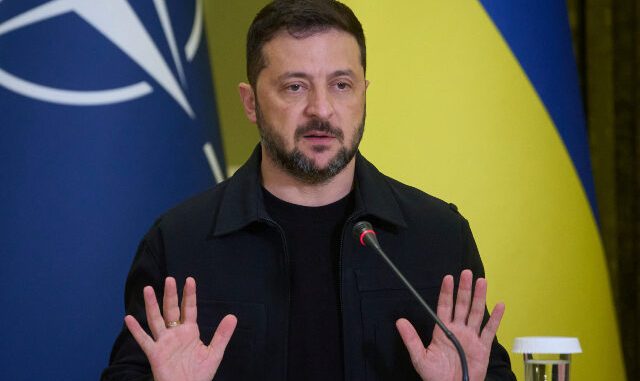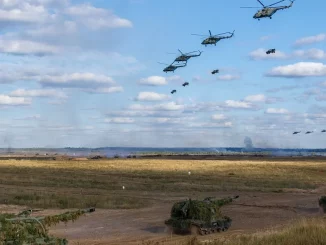
Published August 23, 2025
Chinese officials and state media reacted with sputtering outrage after Ukrainian President Voldoymyr Zelensky said the Russia-allied communist tyranny was not welcome as part of the prospective coalition that will secure Ukraine’s postwar borders.
August 22–23, 2025 — Chinese officials and state-run media reacted with visible outrage after Ukrainian President Volodymyr Zelensky firmly rejected the idea of China participating in postwar security guarantees for Ukraine.
Zelensky’s Rejection
Speaking at a press briefing on August 21, 2025, Zelensky questioned Beijing’s suitability as a guarantor of Ukraine’s security:
“Why isn’t China one of the security guarantors? We don’t need guarantors that don’t help Ukraine. Beijing assisted Russia by opening access to the drone market,” he declared.
“We don’t need guarantors who don’t help Ukraine—and didn’t help Ukraine when we really needed it. We need security guarantees only from those countries ready to help us.”
Russia’s Push for UNSC-Backed Guarantees Including China
The timing of Zelensky’s remarks followed proposals from Russian Foreign Minister Sergey Lavrov, who sought to revive a 2022 plan to involve all UN Security Council permanent members—including Russia and China—in providing security for Ukraine. Moscow insisted that such guarantees should include both countries, rejecting alternate frameworks.
Lavrov labeled any deviation as “an absolutely futile undertaking”.
Beijing’s Immediate Rebuke
Beijing’s response was swift. Global Times issued a lengthy rebuke, accusing Zelensky of misjudging China’s role:
“China has always been open and aboveboard … upholding an objective and just position … China stands ready to play a constructive role,” the statement read.
Foreign Ministry spokesperson Mao Ning reiterated that “China did not create the Ukraine crisis” but has maintained an objective stance, promoting dialogue and peaceful resolution. Similarly, embassy spokesman Liu Pengyu emphasized China’s willingness to engage in a “constructive role,” appealing to the international community’s broader efforts.
Criticism of China’s “Peace Plan”
Critics—including Zelensky and Western analysts—noted that China’s 12-point peace plan (released in early 2023) omitted any condemnation of Russian aggression, failed to call for withdrawal, and focused only on opposing Western sanctions. The plan was dismissed by Kyiv and largely ignored by Moscow.
Ukraine’s Position & Broader Context
Since the 2022 invasion, Kyiv has shown increasing reluctance to include Russia—or its key backers like China—in any security framework that might dilute its sovereignty. Lavrov’s insistence that security guarantees remain tied to the 2022 proposal, granting veto-like influence to Moscow (and potentially Beijing), has deepened Ukrainian skepticism.
Meanwhile, Ukraine continues to seek “Article 5-like” security guarantees from Western allies—especially the U.S. and NATO—amid stalled diplomatic progress and continued Russian hostilities.
 Resulting Effects:
Resulting Effects:
-
Strained China–Ukraine Relations: Zelensky’s rejection hardens the divide, making future diplomatic cooperation between Kyiv and Beijing increasingly unlikely.
-
Tighter Russia–China Alignment: Beijing’s defense of Moscow’s role further entrenches the partnership, signaling to the West that China remains unwilling to break ranks.
-
Greater Dependence on the West: By excluding China, Ukraine narrows its security options and doubles down on Western guarantees, effectively tying its long-term defense posture to NATO and the U.S.
-
Diplomatic Deadlock: With Moscow demanding inclusion and Kyiv flatly refusing, negotiations risk stagnating, prolonging instability and reducing chances for a broad-based peace deal.
-
Global Polarization: The episode deepens the split between democratic alliances and authoritarian blocs, reinforcing the perception of Ukraine’s war as a frontline conflict between competing world orders.
 Bottom Line:
Bottom Line:
China’s anger at Zelensky’s outright dismissal highlights the widening fault lines in global diplomacy over Ukraine’s future. While Moscow presses for a framework that keeps both Russia and China at the center of Ukraine’s security, Kyiv is drawing clear boundaries—rejecting guarantors it sees as complicit in its suffering. Beijing’s claims of neutrality ring hollow to Ukraine, which views China’s economic and technological support for Russia as incompatible with any genuine peace role. Ultimately, Ukraine’s insistence on security guarantees only from committed Western partners signals a decisive geopolitical realignment: one that excludes Russia’s allies and solidifies the war as a defining clash between rival world orders.





Be the first to comment